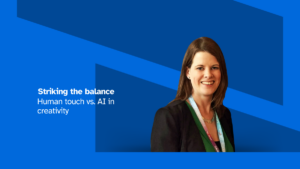By Dom Sweeney, Head of Creative at INNOCEAN UK
Professor Stuart Russell described AI as ‘The most profound change in human history’.
Bit dramatic.
But I can see where he’s coming from. Because extending the backgrounds on an advertising layout and improving the grammar on a paragraph of copy is nothing to be sniffed at.
It’s a strange weakness we have in advertising, the slightly narcissistic reaction to anything new is to make it about us. In advertising we love a new gadget. A bandwagon to jump on. A gimmick to use. Last year it was the metaverse. The year before that, NFT’s. This year everyone’s got an opinion about how AI is going to impact advertising for better or worse. And I am precisely the thing that the world does not need more of right now – another creative talking about artificial intelligence. A turkey with something to say about Christmas.
While there is a temptation to reach for the pitchfork and shout ‘They took our jobs’ at the nearest Wi-Fi router, the exciting thing about the potential of AI, if we allow ourselves to be naïve, is that it won’t put an end to work. It’ll put an end to what feels like work. If we’re narcissistically keeping it all about us in the creative advertising industry, the onerous search for stock photography will be a thing of the past. As will the repetitive, mechanical retouching and post-production. One day AI will even be able to put together presentations, give talks and get on top of life admin.
For that, every creative should rejoice, because AI has the potential to liberate them to do what they do best. Which is looking out of a window and imagining a world filled with breakdancing ferrets. What it can’t do, is come up with ideas. Which is quite handy, because that’s the bit that we love.
Sir John Hegarty famously said that advertising is 80% idea and 80% execution. Creative thinking and creative craft. And it’s clear today that AI will have a profound impact on one more than the other.
As a creative in an advertising agency, my principal job isn’t to understand AI, or photography, or retouching, or how to pull the focus on a camera. Of course, I have to understand all those things as best I can. But my key role is to understand human beings. AI can make it quicker and more cost effective to bring our ideas to life. But until AI can effectively understand the complexity of the human condition, (which it currently can’t) then our jobs are safe.
Good for us.
How should we be using AI?
AI is a tool. Nothing more, nothing less. Its role is to do the things we don’t want to do quicker, or the things we can’t do better. What AI should not be doing is coming up with ideas.
An example of AI working to support us is using generative AI to change stock imagery. What would normally take at least a day of sourcing stock imagery and cutting out masks etc, instead can take half an hour. As a result, creatives can streamline the process for clients, extending backgrounds to fit different formats, and producing higher quality work, at speed. Our time can be better spent on adding the finishing touches to an image, rather than fixing it.
Another example is combining two different images and letting AI do the donkey work. When it comes to moving image, I’m sure you’ve all seen the Coca Cola film ‘masterpiece’. The ad takes the viewer on a visual journey following a Coca Cola bottle making it way from one iconic piece of art to the next, eventually landing in the hands of a parched student in need of some inspiration.
Whilst this is all very impressive to the creative industry, ultimately, the general public and audience don’t care how an ad is made. The use of AI doesn’t yet improve the end result, nor does it impact the audience. But what it does do is support the tight deadlines and budgets restrictions that agencies face on a daily basis. As it stands, AI is levelling the playing fields, not improving the quality of the final product.
Perfectly imperfect
As AI improves it will be more important for us to find ways to battle against the sanitised perfection that can render advertising lifeless and uninteresting. Why? Because it’s the roughness round the edges that can make a difference. History is replete with tales of error and unpredictable serendipity that can make an idea so much more memorable. The unscripted ‘simples’ in Compare the Market, or the Smash Martian accidentally falling off his stool laughing at the stupidity of humans mashing potatoes. These moments are unpredictable because they were ‘mistakes’ and would be lost in the rush to cede control to AI, which is only as good as the predictable prompts it’s given.
How we insert the right kind of wrong into the process will be fascinating.
Creativity cannot be learnt or replaced
Creativity has nothing to do with intelligence. It’s entirely linked to personality.
The psychologist Mihaly Csikszentmihalyi defined the antithetical traits that often present in creative people. It’s the Empathy that comes hand in hand with sensitivity that’s probably the most important personality trait because psychologists have linked it to the ability to make people laugh. You can’t be funny if you don’t understand people. AI cannot have empathy as it cannot feel human emotion. So how can it be creative to the fullest degree.
When it comes to thinking up ideas, AI feels like a non-starter. But when it comes to freeing creative thinkers up, to concentrate on doing the thing that their personalities dictate they must do – it can only lead to better, more human work. And being more human in our communications is going to be the key to creating work that stands out.
The last word should really go to Alan Turing. “If a machine is expected to be infallible, it cannot also be intelligent.”
He was of course talking about the Turing Test – the game to see whether a computer can fool a person into believing that they’re talking to another human. Let’s not try to fool people. Let’s be original and unique and genuinely human. Because creativity isn’t an imitation game.









